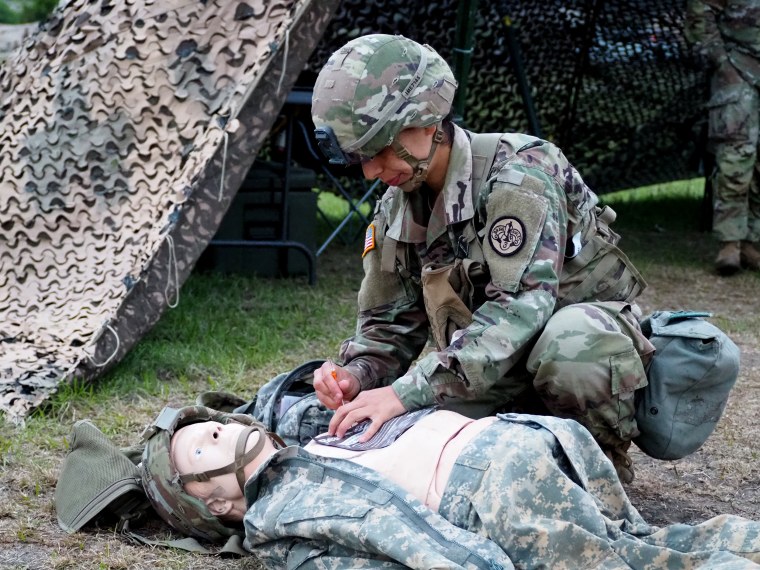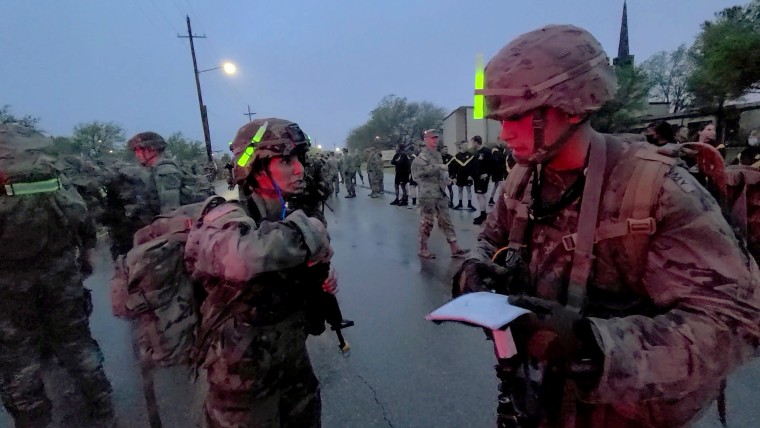Imagine having to complete a physically demanding test that requires navigating terrain until 4 a.m., a 12-mile foot march while carrying full armor, having to put on equipment for a possible chemical attack, and disassembling a weapon all in just five days.
During a grueling week, 1st Lt. Maria Eggers recently did just that, making her the first woman and the first Latina from the 3rd Cavalry Regiment to earn the coveted Expert Infantry Badge, or EIB, qualifying at the highest level — True Blue.
Eggers, 24, received it in April by successfully finishing the five-day test that measures a soldier's physical fitness and ability to perform to standards of excellence in a wide variety of critical infantry skills. The test measures the mastery of those skills through different evaluations and varying degrees of stress. It's a feat for women as fewer than 100 in the entire U.S. Army have received it —all combat roles were opened to women in 2016.
In a phone interview with NBC News, Eggers said she was surprised when she heard she was the first Latina to earn the award in the regiment, currently stationed at Ford Hood. As someone who grew up with two parents in the military, she said she's always seen herself as a soldier and a part of the team.
"I was shocked by how few females have had the opportunity or who have tried," she said. "I definitely think it is amazing that we have females that are in this profession and that we're succeeding. There is a lot of good talk that happens whenever somebody is successful. It just shows that we can do it, and that females are strong and we can handle this job too."

Eggers is a platoon leader in the 1st Squadron where she manages and organizes 37 soldiers; she has been at Fort Hood for over nine months.
After a monthlong preparation, the week of testing began with soldiers running 4 miles in 40 minutes, and then showing their weapons skills. The following day involved day and night land navigation courses participants had to traverse while wearing their combat gear.
During the next two days, soldiers undertook tasks that included demonstrating how to properly take care of injured personnel when it comes to bleeding, fractures and burns. The last day was the 12-mile foot march, also known as the ruck, which had to be completed in three hours while wearing full armor. At the last station, she had to disassemble and assemble her weapon.
Dealing with the exhaustion was the hardest part of the experience.
"I think a lot of the time when people don't get their EIBs, it's because they, one, missed a very small thing or they're just so tired that they can't think properly," she said. "I think that's probably the hardest part — just having that mental fortitude and toughness just to make it through the week."
When she completed the ruck, she said, she felt a sense of relief that she had made it through the entire test. It's an accomplishment she is very proud of.

Fort Hood has been the focus of attention following the disappearance and killing of Army Spc. Vanessa Guillén. A fellow soldier about to be arrested in connection with the case shot and killed himself, according to authorities.
An Army report released last week found Guillén had previously been sexually harassed by a supervisor but the unit leadership had not taken action, though that incident was not related to her killing.
Last week, Sen. Kirsten Gillibrand, D-N.Y., and Sen. Joni Ernst, R-Iowa, introduced bipartisan legislation calling for independent military prosecutors to handle sexual assault cases and other serious crimes in the military.
"Military is almost a family business"
Eggers, whose mother is of Mexican and Puerto Rican descent, was born in Georgia to a military family. She pursued her goal of continuing in the family tradition by attending an ROTC program at Florida State University.
The best part of her Army experience, she said, is getting to meet people from many different backgrounds while enjoying a variety of benefits, such as academic opportunities and sports programs.
"I think the military is a lifestyle and almost a family business, if you could say," Eggers said. "Anything you can do on the civilian side, you can do in the Army."
Follow NBC Latino on Facebook, Twitter and Instagram.
